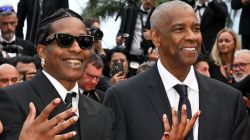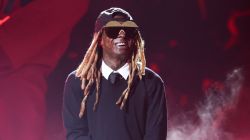The cold war between JAY-Z and Kanye West has been ongoing since late last year. Even amid talk the two were on their way to a reconciliation, there’s been no formal truce announced on either side (at least publicly). Despite the rift, Hov still cited a Yeezy line during a recent interview with the New York Times.
When asked about the election of Donald Trump and whether it’s reignited the race debate in America, the Hip Hop titan answered the question with a reference to “Never Let Me Down” (featuring Jigga) from West’s 2004 debut studio album, The College Dropout.
“Yeah, there was a great Kanye West line in one of [his] songs: ‘Racism’s still alive, they just be concealin’ it,'” the 47-year-old rap legend tells NYT Executive Editor, Dean Baquet. “Take a step back. I think when Donald Sterling got kicked out of the N.B.A., I thought it was a misstep, because when you kick someone out, of course he’s done wrong, right? But you also send everyone else back in hiding. People talk like that. They talk like that. Let’s deal with that.
“I wouldn’t just, like, leave him alone,” he adds. “It should have been some sort of penalties. He could have lost some draft picks. But getting rid of him just made everyone else go back into hiding, and now we can’t have the dialogue. The great thing about Donald Trump being president is now we’re forced to have the dialogue. Now we’re having the conversation on the large scale; he’s provided the platform for us to have the conversation.”
Elsewhere in the interview, Hov opens up about his marriage to Beyoncé, going to therapy and how his therapy sessions helped him recognize pain in others.
“I grew so much from the experience,” he says. “But I think the most important thing I got is that everything is connected. Every emotion is connected and it comes from somewhere. And just being aware of it. Being aware of it in everyday life puts you at such a … you’re at such an advantage. You know, you realize that if someone’s racist toward you, it ain’t about you. It’s about their upbringing and what happened to them, and how that led them to this point. You know, most bullies bully. It just happen. Oh, you got bullied as a kid so you trying to bully me. I understand.
“And once I understand that, instead of reacting to that with anger, I can provide a softer landing and maybe, ‘Aw, man, is you O.K.?'” he continues. “I was just saying there was a lot of fights in our neighborhood that started with, ‘What you looking at? Why you looking at me? You looking at me?’ Then you realize: ‘Oh, you think I see you. You’re in this space where you’re hurting, and you think I see you, so you don’t want me to look at you. And you don’t want me to see you.’ You don’t want me to see your pain. You don’t … So you put on this shell of this tough person that’s really willing to fight me and possibly kill me ’cause I looked at you. You know what I’m saying, like, so … Knowing that and understanding that changes life completely.”
Hov’s 13th studio album, 4:44, was recently nominated for eight Grammy Awards. It revolves heavily around the topics of marriage, therapy and race, similar to the things he discusses in the NYT interview.
Watch the entire conversation above.








Have you heard of Pimp Tactics?? This Character is a funny guy. He sold drugs to his people right? And he is the same guy that rode every dick in the rodeo. Stole every style in the book, Used real musicans names to make his corny songz sell. Same shit GAME do Now. Befriend people then Turn on them after he rode the 5mins of their New gain Fame. And People are so stupid to not see that. Damn a mind is a terroble thing to waste. Soap Opera Turn Coat Uncle Ben Azz… Stay Kool Joe Camel, You always been WACK.
WOW!!! Lol!
Well said
Lmfaoo you 2nd place with the dick riding, u can hop off his pubic hair now
Say what you say about Hov but all thode tactics made him a great businessman. Not condoning it but lets face it, when it comes to business there’s bound to be shady things and he mastered that. As far as an MC he’s top 10 in mine.
Damn genius, you actually cracked the Hova Codes in under ten sentences…what can you possibly do for an encore? Suggestion: Solve the mystery of why u so corn ball…
The hate is real with you fuck boys
Zip it up you wanna be Rosie Perez
You’re right the People hate on HOV All day I really don’t get it.. this dude built and empire and achieved a lot of success. I don’t understand what’s to hate about that.
If you don’t like the music that’s fine but respect the hustle HOV is in a lane of his own..
There are racist whites, there are racist blacks, there are racist Asians, there are racist Indians, …
Blacks don’t own anything and we have no power that can change white people lifestyle, so we can’t be racist. We might hate people but we are not racist
People hate on HOV so much it’s crazy and the people that hate on him are his own people.. black people hate so much on this dude and than go praise corny ass Eminem y’all get y’all shit together
Really ? Really ? This is genius: “Racism’s still alive, they just be concealin’ it’”….Really? The bar of genius must have dropped 4000 levels because there isn’t a black person who hasn’t said racism is no longer overt..I mean, it’s oldest adage out there…I love Jay-Z and KAnye but cmon people ..that ain’t what makes them brilliant
this guys fuckin stoooopid. quit keepin him relevant.